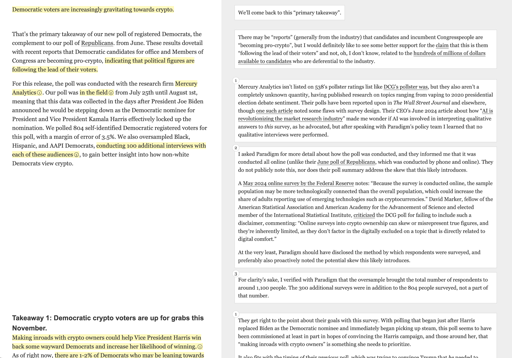As anyone who has tracked SovCit discourse can confirm, the English language was definitively codified for all eternity by the 1996 edition of Black’s Law Dictionary and all other projects including future editions of that venerable title are the result of communist plots to undermine the sanctity of American freedom and our precious bodily fluids.
- 1 Post
- 714 Comments

 4·3 days ago
4·3 days agoAI Overturns Centuries of Forensic Fingerprinting Practice?
Published in Science… Advances
Probably a fair bit to sneer at in the actual study that I’m missing, and the article I first found it in is peak AI Hype. (Big Forensics is trying to keep you from knowing the Truth as found by an undergrad with a GPU) But the part that I found most concerning is that even the whole paper doesn’t appear to break down their 77% accuracy index and provide the specific result ratios that go into it. In a field where each false positive represents a step on the road to innocent people being convicted of major crimes I would really like to know that number specifically.

 6·3 days ago
6·3 days agoLooks like that is indeed the post. I have a number of complaints, but the most significant one is actually in the early part of the narrative where they just assume “companies start to integrate AI” with little detail on how this is done, what kind of value it creates over their competitors, whether it’s profitable for anyone, etc. I’m admittedly trusting David Gerard’s and Ed Zitron’s overall financial analysis here, but at present it seems like the trajectory is moving in the opposite direction, with the AI industry as a whole looking likely to flame out as they burn through their ability to raise capital without ever actually finding a net return on that investment. At which point all the rest of it is sci-fi nonsense. Like, if you want to tell me a story about how we get from here to The Culture (or I Have No Mouth and I Must Scream), those are the details that need to be filled in. How do the intermediate steps actually work. Otherwise it’s the same story we’ve been reading since the 70s.

 2·3 days ago
2·3 days agoI thought you had to wait at least a few generations to start inventing bullshit evo-psych-adjacent explanations for stuff.
Also this joke was funny when XKCD did it in the alt text 16 years ago. Jesus how has it been 16 years what the hell

 5·3 days ago
5·3 days agoNeither, actually. They were testing it by asking how many "T"s appeared in “Llama Four” and it kept saying “2” so they decided to roll with it.

 4·3 days ago
4·3 days agoI also legitimately can’t tell the degree to which they don’t understand they’re LARPing a dystopia versus how much they completely understand that and that’s why it’s gonna be so awesome for them once they make fetch happen.

 11·4 days ago
11·4 days agoA massive domestic infrastructure project with little actual demand? In China of all places? I don’t believe it

 13·4 days ago
13·4 days agoIt’s almost like the tech industry relies on a great deal of general stability, education, and other aspects of society that are broadly considered the responsibility of the state. I think there’s a stock line here about libertarians and cats?

 8·4 days ago
8·4 days agoIf he got into specifics people might think “Damn, I’ve never had that kind of experience with working-class New Yorkers. What gives?” and he might have to consider let alone admit that he was an asshole to someone.

 7·5 days ago
7·5 days agoGiven the apparent state of the art for autogenerated captions (and by extension the initial challenge of speech recognition) being firmly in the “good enough” range I would not trust the chain of speech recognition -> translation -> text-to-speech. That’s a lot of room for errors to chain, multiply, and obscure themselves through GIGO even if the latter two steps did work as expected.

 9·5 days ago
9·5 days agoSo the primary doctrine is basically tech bros rewriting standard millenarian christianity from mythic fantasy into science fiction. But it seems like the founder wants to be a silicon valley influencer more than he wants to be a proper cult leader, meaning that some of the people who take this shit seriously have accumulated absurd amounts of money and power and occasionally the more deranged subgroups will spin off into a proper cult with everything that entails – including, now, being involved in multiple homicides!

 12·5 days ago
12·5 days agoThat’s like a solid centiMoR, which is conveniently the share of HPMoR in which anything actually happens.

 6·7 days ago
6·7 days agoJesus, fine, I’ll watch it already, God.

 10·7 days ago
10·7 days agoYour mistake, distant future ghost, was in developing RNA repair nanites without creating universal healthcare.

 5·8 days ago
5·8 days agoThere’s a particular failure mode at play here that speaks to incompetent accounting on top of everything else. Like, without autocontouring how many additional radiologists would need to magically be spawned inti existence and get salaries, benefits, pensions, etc in order to reduce overall wait times by that amount? Because in reality that’s the money being left on the table; the fact that it’s being made up in shitty service rather than actual money shouldn’t meaningfully affect the calculus there.

 2·9 days ago
2·9 days agoBy refusing to focus on a single field at a time AI companies really did make it impossible to take advantage of Gel-Mann amnesia.

 9·11 days ago
9·11 days agoThere’s inarguably an organizational culture that is fundamentally disinterested in the things that the organization is supposed to actually do. Even if they aren’t explicitly planning to end social security as a concept by wrecking the technical infrastructure it relies on, they’re almost comedically apathetic about whether or not the project succeeds. At the top this makes sense because politicians can spin a bad project into everyone else’s fault, but the fact that they’re able to find programmers to work under those conditions makes me weep for the future of the industry. Even simple mercenaries should be able to smell that this project is going to fail and look awful on your resume, but I guess these yahoos are expecting to pivot into politics or whatever administration position they can bargain with whoever succeeds Trump.

 6·11 days ago
6·11 days agoThat’s fascinating, actually. Like, it seems like it shouldn’t be possible to create this level of grammatically correct text without understanding the words you’re using, and yet even immediately after defining “unsupervised” correctly the system still (supposedly) immediately sets about applying a baffling number of alternative constraints that it seems to pull out of nowhere.
OR alternatively despite letting it “cook” for longer and pregenerate a significant volume of its own additional context before the final answer the system is still, at the end of the day, an assembly of sochastic parrots who don’t actually understand anything.

 16·11 days ago
16·11 days agoI don’t think that the actual performance here is as important as the fact that it’s clearly not meaningfully “reasoning” at all. This isn’t a failure mode that happens if it’s actually thinking through the problem in front of it and understanding the request. It’s a failure mode that comes from pattern matching without actual reasoning.


As a prominent intellectual voice criticizing the current administration, our boy Curtis should really be grateful that they don’t hew more closely to his preferred fascist project, as if they did they would have the incentive to be just as if not more brutal in stomping out “credible” independent opposition from the right as from existing liberal institutions. After all the fascist project relies on subverting existing institutions that are too tied up in their own bureaucracy and politicking to effectively oppose them, while the whole point Yarvin has made across his whole career is that the fascists have no such impediment or incentive for restraint. The Night of the Long Knives predated Kristallnacht by more than 4 years, after all.